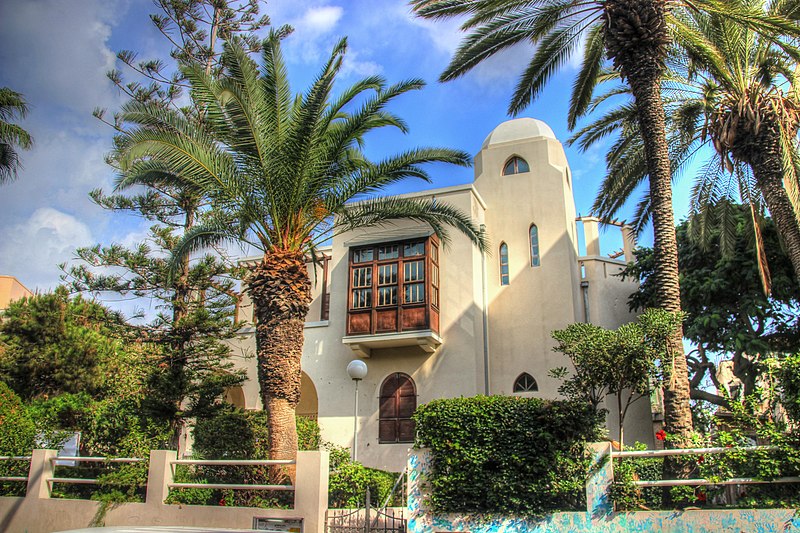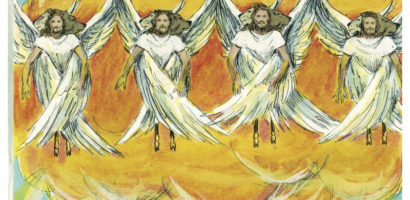The 20th century was without a doubt the most eventful century for the Jewish people since the 1st century. The calamity of the Holocaust followed by the establishment of the State of Israel is more consequential than anything the Jewish people experienced collectively in two millennia. But no less historic than the return of the Jewish people to the Land of Israel in the 20th century, was the concurrent rebirth of the Hebrew language. Although the Jewish people never forgot Hebrew (it was always used for prayer and sacred studies), the late 19th and 20th century marked the return of Hebrew as the spoken language of daily life. Started in the late 19th century as the eccentric private project of Eliezer Ben Yehuda, the revival of Hebrew has achieved resounding success. Today, Modern Hebrew is the official language of the State of Israel, where it is spoken by over eight million people.

H.N. Bialik’s house in Tel Aviv, today a museum
Instrumental in the modern project of bringing Hebrew up to speed as a viable 20th century language was the poet and author Hayyim Nahman Bialik (1873-1934). Bialik was born a small village called Radi (near Zhytomyr, Ukraine) and grew up in a very traditionally religious Jewish home. He was a brilliant Talmud student, but as an adolescent he began to lose interest in the practice of Orthodox Judaism. In secret, he immersed himself in secular studies such as philosophy and Russian literature.

Hayyim Nahman Bialik, 1923
At the age of 19 Bialik published his first poem in Hebrew, entitled “To the Bird” (El HaTzipor אל הציפור). This poem is a true landmark of modern Hebrew literature. It tells the story of a migratory bird that has returned to Europe after flying south to the Land of Israel for the winter. The poet, who has never been to the Land of Israel, welcomes the bird home with a barrage of questions, clearly indicating his deep longing to experience the Land of the Bible firsthand. The poem takes us on a virtual tour of the diverse landscape of Israel, fluctuating between the idealized Biblical past and the dour European present.

Each year, hundreds of thousands of migratory birds (cranes, eagles, pelicans, storks to name a few species) fly over the Land of Israel, taking advantage of the thermal column in the Jordan Rift Valley. For several weeks the birds stop down in the Hula Valley to refuel. Particularly in the spring and fall, this valley becomes one of the most popular bird-watching spots in the world.
In this post I would like to share my translation of this poem into English. The original in Hebrew can be found at the end.
To the Bird, by H. N. Bialik (1891)
Translated from the Hebrew by Jonathan A. Lipnick
Greetings to you, kind bird, upon your return
From the hot lands back to my window
Back to your pleasing voice, My soul perishes
In the winter when you leave.
Sing, tell me, my beautiful bird,
About the wonders of the distant land.
Is it full of evils and hardships also
There in the hot beautiful land?
Will you bring me regards from my brothers in Zion, From my brothers far and near?
O happy they are! Do they know
How I suffer, O suffer, from grief?
Do they know how many accusers I have here,
How many, so many, rise up against me?
Sing, my bird, of the wonders of the land
The spring is coming, but to stay forever.
Will you bring me from the bounty of the land,
From the valleys and ravines, from the mountaintops?
Has God had compassion, has he comforted Zion,
Or is she still left to the graves?
Have the valley of the rose and the hill of frankincense
Produced their myrrh and spikenard?
Has the old man in the woods, the sleeping Lebanon, Awaken from his slumber?
Does the dew drip like pearls on Mount Hermon
Does it drip and fall like tears?
And how fares the Jordan and its clear waters?
And how about all the mountains, the hills?
Has the heavy cloud which spreads gloom
and the shadow of death departed?
Sing, my bird, of the land in which
My fathers found life and death!
Have the flowers which I planted
Not yet withered, as I have withered?
I recall days when I blossomed like they,
Now I have aged and my strength is no more.
Tell me, my bird, the secret of all secrets
And what did they whisper of their prey?
Did they offer comfort or hope for days
When its fruit like the Lebanon will roar?
And my brothers the workers who sow with tears,
Have they harvested the omer with joy?
O that I had wings to fly to the land
Where the almond and date-palm blossom!
What shall I tell you, good bird?
What do you expect to hear from my mouth?
From this cold corner of the earth you will not hear songs,
Only dirges and sighs and wailing.
Shall I tell you about the hardships
Which are known in the land of the living?
O who will count the number of passing sorrows,
The approaching and raging troubles?
Fly, my bird, to your mountain, your desert
You are happy for you have left my tent.
Were you to live with me, O wing of song,
You too would cry bitter tears at my fate.
But weeping and tears will bring no cure
These cannot heal my wounds.
My eyes have grown dim, a sack filled with tears
My heart has been struck like a weed.
Now the tears and the bruises have stopped
But the end of my sorrow has not yet come.
Greetings my dear bird upon your return
Oh please cry aloud for joy!
אֶל הַצִפּוֹר / חיים נחמן ביאליק
שָׁלוֹם רָב שׁוּבֵךְ, צִפֹּרָה נֶחְמֶדֶת,
מֵאַרְצוֹת הַחֹם אֶל-חַלּוֹנִי –
אֶל קוֹלֵךְ כִּי עָרֵב מַה-נַּפְשִׁי כָלָתָה
בַּחֹרֶף בְּעָזְבֵךְ מְעוֹנִי.
זַמְּרִי, סַפֵּרִי, צִפּוֹרִי הַיְקָרָה,
מֵאֶרֶץ מֶרְחַקִּים נִפְלָאוֹת,
הֲגַם שָׁם בָּאָרֶץ הַחַמָּה, הַיָּפָה,
תִּרְבֶּינָה הָרָעוֹת, הַתְּלָאוֹת?
הֲתִשְׂאִי לִי שָׁלוֹם מֵאַחַי בְּצִיּוֹן,
מֵאַחַי הָרְחוֹקִים הַקְּרוֹבִים?
הוֹי מְאֻשָּׁרִים! הֲיֵדְעוּ יָדֹעַ
כִּי אֶסְבֹּל, הוֹי אֶסְבֹּל מַכְאוֹבִים?
הֲיֵדְעוּ יָדֹעַ מָה רַבּוּ פֹה שֹטְנַי,
מָה רַבִּים, הוֹי רַבִּים לִי קָמִים?
זַמְּרִי, צִפּוֹרִי, נִפְלָאוֹת מֵאֶרֶץ,
הָאָבִיב בָּהּ יִנְוֶה עוֹלָמִים.
הֲתִשְׂאִי לִי שָלוֹם מִזִּמְרַת הָאָרֶץ,
מֵעֵמֶק, מִגַּיְא, מֵרֹאשׁ הָרִים?
הֲרִחַם, הֲנִחַם אֱלוֹהַּ אֶת-צִיּוֹן,
אִם עוֹדָהּ עֲזוּבָה לִקְבָרִים?
וְעֵמֶק הַשָּׁרוֹן וְגִבְעַת הַלְּבוֹנָה –
הֲיִתְּנוּ אֶת-מֹרָם, אֶת-נִרְדָּם?
הַהֵקִיץ מִשְּׁנָתוֹ הַשָּׂב בַּיְּעָרִים,
הַלְבָנוֹן הַיָּשֵׁן, הַנִּרְדָּם?
הֲיֵרֵד כִּפְנִינִים הַטַּל עַל הַר חֶרְמוֹן,
אִם יֵרֵד וְיִפֹּל כִּדְמָעוֹת?
וּמַה-שְּׁלוֹם הַיַּרְדֵּן וּמֵימָיו הַבְּהִירִים?
וּשְׁלוֹם כָּל-הֶהָרִים, הַגְּבָעוֹת?
הֲסָר מֵעֲלֵיהֶם הֶעָנָן הַכָּבֵד,
הַפֹּרֵשׂ עֲלָטָה, צַלְמָוֶת? –
זַמְּרִי, צִפּוֹרִי, עַל-אֶרֶץ בָּה מָצְאוּ
אֲבוֹתַי הַחַיִּים, הַמָּוֶת!
הַאִם-עוֹד לֹא-נָבְלוּ הַפְּרָחִים שָׁתַלְתִּי
כַּאֲשֶׁר נָבַלְתִּי אָנֹכִי?
אֶזְכְּרָה יָמִּים כְּמוֹהֶם פָּרַחְתִּי,
אַךְ עַתָּה זָקַנְתִּי, סָר כֹּחִי.
סַפְּרִי, צִפּוֹרִי, סוֹד שִׂיחַ כָּל-שִׂיחַ,
וּמַה-לָּךְ טַרְפֵּיהֶם לָחָשׁוּ?
הֲבִשְּׂרוּ נִחוּמִים אִם-קִווּ לְיָמִים,
פִּרְיָמוֹ כַּלְּבָנוֹן יִרְעָשׁוּ?
וְאַחַי הָעֹבְדִים, הַזֹּרְעִים בְּדִמְעָה –
הֲקָצְרוּ בְרִנָּה הָעֹמֶר? –
מִי יִתֶּן-לִי אֵבֶר וְעַפְתִּי אֶל-אֶרֶץ
בָּה יָנֵץ הַשָּׁקֵד, הַתֹּמֶר!
וַאֲנִי מָה אֲסַפֵּר לָךְ, צִפּוֹר נֶחְמָדָה,
מִפִּי מַה-תְּקַוִּי לִשְׁמֹעַ?
מִכְּנַף אֶרֶץ קָרָה לֹא-זְמִירוֹת תִּשְׁמָעִי,
רַק קִינִים, רַק הֶגֶה וָנֹהַּ.
הַאֲסַפֵּר הַתְּלָאוֹת, שֶׁכְּבָר הֵן בְּאַרְצוֹת
הַחַיִּים נִשְׁמָעוֹת, מוּדָעוֹת? –
הוֹי, מִסְפָּר מִי יִמְנֶה לַצָּרוֹת הָעֹבְרוֹת,
לְצָרוֹת מִתְרַגְּשׁוֹת וּבָאוֹת?
נוּדִי, צִפּוֹרִי, אֶל-הָרֵךְ, מִדְבָּרֵךְ!
אֻשַּׁרְתְּ, כִּי עָזַבְתְּ אֶת-אָהֳלִי;
לוּ עִמִּי שָׁכַנְתְּ, אָז גַּם-אַתְּ, כְּנַף רְנָנִים,
בָּכִית, מַר בָּכִית לְגוֹרָלִי.
אַךְ לֹא בְכִי וּדְמָעוֹת לִי גֵהָה יֵיטִיבוּ,
לֹא אֵלֶּה יְרַפְּאוּ מַכָּתִי;
כְּבָר עֵינַי עָשֵׁשׁוּ, מִלֵּאתִי נֹאד דְּמָעוֹת,
כְּבָר הֻכְּתָה כָּעֵשֶׂב לִבָּתִי;
כְּבָר כָּלוּ הַדְּמָעוֹת, כְּבָר כָּלוּ הַקִּצִּים –
וְלֹא הֵקִיץ הַקֵּץ עַל-יְגוֹנִי,
שָׁלוֹם רָב שׁוּבֵךְ, צִפּוֹרִי הַיְקָרָה,
צַהֲלִי-נָא קוֹלֵךְ וָרֹנִּי!





Join the conversation (No comments yet)